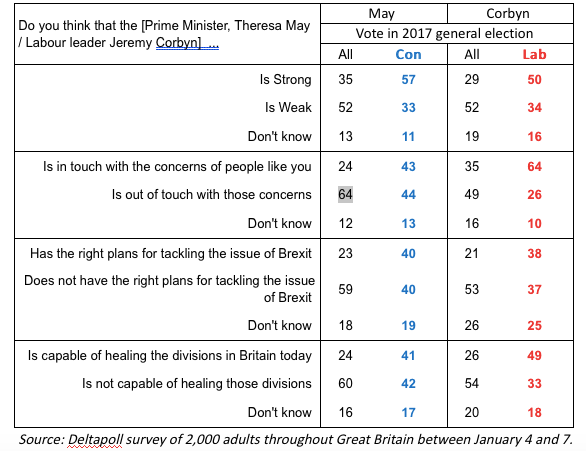Credit: Leon Neal / Getty Images
Something odd, and possibly dangerous, is eating away at the fabric of British politics. Brexit, of course, has much to do with it, but the consequences could be with us long after the current crisis is resolved, one way or another.
Signs of the malaise can be clearly seen in an exclusive survey for UnHerd conducted by Deltapoll. It shows a remarkable lack of faith in both main party leaders, not just by voters generally but by high proportions of their own voters. Loyalties are being tested as never before.
In the past, one party leader has occasionally had a shaky reputation among their own supporters on one or two characteristics. In the early 1980s, many Labour voters thought Michael Foot was weak; towards the end of her premiership, many Tories considered Margaret Thatcher out of touch. But I have never seen so many supporters of both parties simultaneously hold such low opinions of their own leaders across the board.
Here is the evidence. The following table shows the main findings.

Consider first the two columns, in black type, showing the responses of all voters. Both leaders have strongly negative ratings on all counts. That is unusual enough. But when we look at the blue figures, showing how Conservative voters view Theresa May, and the red figures, showing how Labour voters view Jeremy Corbyn, the scale of the drama becomes clear. The positive scores for May range from 57% of Conservative supporters who say she is strong, down to 40% who back her on Brexit. Her average score among Tory voters is 45%. Labour voters give Corbyn positive scores ranging from 64 to 38%; his average is 50%. Among all voters, the averages are, of course, even worse: May 26%, Corbyn 28%.
To put these figures in context, a successful leader would expect average scores of around 80% among their party’s own voters and 40% among the general public. For both leaders to fall so far short of these figures should set off alarm bells in both parties.
Here, though, is the paradox. Precisely because both leaders have terrible ratings, the scale of the problem is less obvious than it would be if only one was doing badly. In that case (as when Foot led Labour and towards the end of Thatcher’s premiership), their party would have support well below 30% in the polls and facing a landslide defeat. Instead, nothing much seems to have changed since the 2017 election. An average of recent polls shows the two parties still close together, and with almost as many supporters as 18 months ago. The high commands in both parties, though plainly struggling over Brexit, see no wider reason to panic.

 Main Edition
Main Edition US
US FR
FR






Join the discussion
Join like minded readers that support our journalism by becoming a paid subscriber
To join the discussion in the comments, become a paid subscriber.
Join like minded readers that support our journalism, read unlimited articles and enjoy other subscriber-only benefits.
Subscribe